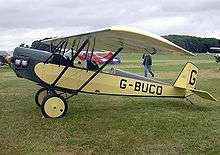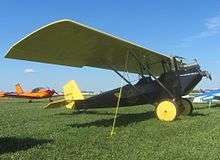Pietenpol Air Camper
| Air Camper | |
|---|---|
 | |
| UK variant Pietenpol Air Camper | |
| Role | Amateur-built airplane |
| Manufacturer | Pietenpol |
| Designer | Bernie Pietenpol |
| First flight | 1928 |
| Variants | Grega GN-1 Aircamper Pietenpol Sky Scout St Croix Pietenpol Aerial St Croix Pietenpol Aircamper |


The Pietenpol Air Camper is a simple parasol wing homebuilt aircraft designed by Bernard H. Pietenpol. The first prototype that became the Air Camper was built and flown by Pietenpol in 1928.[1][2][3][4]
Development
The Air Camper was designed to be built of spruce and plywood. One of Pietenpol's goals was to create a plane that was affordable and easy to construct for home builders. Building an Air Camper requires basic woodworking skills and tools. Builders also need to fabricate some metal fittings to attach the wooden parts together. Some welding is required. The plans for the Pietenpol Aircamper were originally published in a four-part serial in the "Flying and Glider" Manual of 1932-33.[3][4]
The original model was flown using an Ace four cylinder water-cooled engine.[3] The Model A Ford engine later became the standard powerplant used.[1][3] Other engines have also been used including the inline-four, similarly liquid-cooled Ford Model T and Ford V8, air-cooled Velie or Kinner radial engines; and Lycoming, Franklin, Continental and Chevrolet Corvair air-cooled flat-configuration engines.[3]
In the 1960s Bernard Pietenpol began to favor converted engines from Chevrolet Corvair automobiles. The Corvair engine was smoother, stronger and significantly lighter in weight compared to the Model A, as the Corvair automobiles used air-cooled, flat-six configuration engines, similar in design to those already available (in generally larger displacements) for general aviation use. The length of a Pietenpol varies with the engine choices, as engines that are lighter than the Fords need to be mounted further out from the firewall for weight and balance reasons.[5] Over the years over 30 different engines have flown in the Pietenpol Air Camper. Many modern Pietenpol builders prefer Continental A65, C85 or C90 air-cooled flat four powerplants.[3] Several examples of the Aircamper have been built in Europe and are currently (2012) flying.
In the 1920s and 1930s kits were available for the design, but there were none available again until 2015 when the Pietenpol Aircraft Company introduced a kit version of the Air Camper, with components supplied by Aircraft Spruce & Specialty. The kit includes all parts except the engine, aircraft dope and the aircraft fabric covering, and hardware.[6]
Variants
- Pietenpol Sky Scout
- BH Pietenpol also designed and published plans for a single-seat version of the aircraft named the Pietenpol Sky Scout, which was slightly smaller and was powered by the Ford Model T engine.[3] During the late 1920s and early 1930s, this was less expensive than the Model A used in the Air Camper.[7]
- UK LAA-approved Pietenpol Air Camper
- In some countries, civil aviation authority approval is required for each experimental aircraft design, in addition to the approval of each aircraft an individual makes, as in the US. A variant of the Pietenpol Air Camper was designed by Mr. J. K. Wills, and UK Light Aircraft Association approval was obtained for this variant.[8]
- Grega GN-1 Aircamper
- A plans-only homebuilt design similar to the Air Camper using a Piper Cub wing.
- St Croix Pietenpol Aerial
- A biplane adaptation, designed by Chad and Charles Willie and produced by St Croix Aircraft of Corning, Iowa, first flown in 1977.[9]
- St Croix Pietenpol Aircamper
- An adaptation of the original design with more wingspan, longer fuselage and higher gross weight.[9]
Specifications (Typical Air Camper)
Data from B.H. Pietenpol And Sons Air Camper Aircraft (2013). "How to Build a Pietenpol Air Camper or Sky Scout Airplane". Retrieved May 14, 2013.
General characteristics
- Crew: One pilot
- Capacity: One passenger
- Length: 17 ft 8 in (5.39 m)
- Wingspan: 29 ft 0 in (8.84 m)
- Height: 6 ft 6 in (1.98 m)
- Wing area: 135 ft² (12.5 m²)
- Empty weight: 610 lb (277 kg)
- Loaded weight: 995 lb (452 kg)
- Max. takeoff weight: 1080 lb (490 kg)
- Powerplant: 1 × Ford Model A automotive conversion engine, 40 hp (30 kW)
Performance
- Maximum speed: 86 knots (100 mph, 160 km/h)
- Stall speed: 30 knots (35 mph, 56 km/h)
- Rate of climb: 500 ft/min (152 m/min)
- Wing loading: 7 lb/ft² (36 kg/m²)
See also
- Aircraft of comparable role, configuration and era
- Aerotique Parasol
- Dormoy Bathtub
- Fisher FP-505 Skeeter
- Heath Parasol
- Letov Š 39
- Loehle Sport Parasol
- Long Henderson Longster
- Pop's Props Cloudster
- Pop's Props Zing
- RagWing RW1 Ultra-Piet
- Smith Termite
- Related lists
References
- 1 2 Bowers, Peter M.: Guide to Homebuilts, 9th Edition, pages 10-12. Tab Books, 1984. ISBN 0-8306-2364-7
- ↑ Plane and Pilot: 1978 Aircraft Directory, page 150. Werner & Werner Corp Publishing, 1978. ISBN 0-918312-00-0
- 1 2 3 4 5 6 7 B.H. Pietenpol And Sons Air Camper Aircraft (2013). "How to Build a Pietenpol Air Camper or Sky Scout Airplane". Retrieved May 14, 2013.
- 1 2 Bayerl, Robby; Martin Berkemeier; et al: World Directory of Leisure Aviation 2011-12, page 115. WDLA UK, Lancaster UK, 2011. ISSN 1368-485X
- ↑ "Pete takles a passel of Peitenpols". Air Trails: 61. Winter 1971.
- ↑ "Classic Pietenpol Now In Kit Form". avweb.com. Retrieved 13 April 2015.
- ↑ Sport Aviation. Feb 1958. Missing or empty
|title=(help) - ↑ Light Aircraft Association (21 June 2013), LAA Type Acceptance Data Sheet TADS 047 Pietenpol Aircamper, retrieved 16 February 2014
- 1 2 Purdy, Don: AeroCrafter - Homebuilt Aircraft Sourcebook, Fifth Edition, page 248. BAI Communications, 15 July 1998. ISBN 0-9636409-4-1
External links
| Wikimedia Commons has media related to Pietenpol Air Camper. |
- Pietenpol Airplanes in MNopedia, the Minnesota Encyclopedia
- Pietenpol family site
- Sky Camper history on AirVenture Museum site
- "The Pietenpol Story" by Chet Peek - Book covering the history of Bernard Pietenpol's Design
- Video of a Model A-engined Air Camper engine start and runup
- Walkaround and In-Flight Video of an original-style Air Camper
- HOT ROD Magazine's Guide to Early Ford Four-cylinder engines, later used to power Air Campers